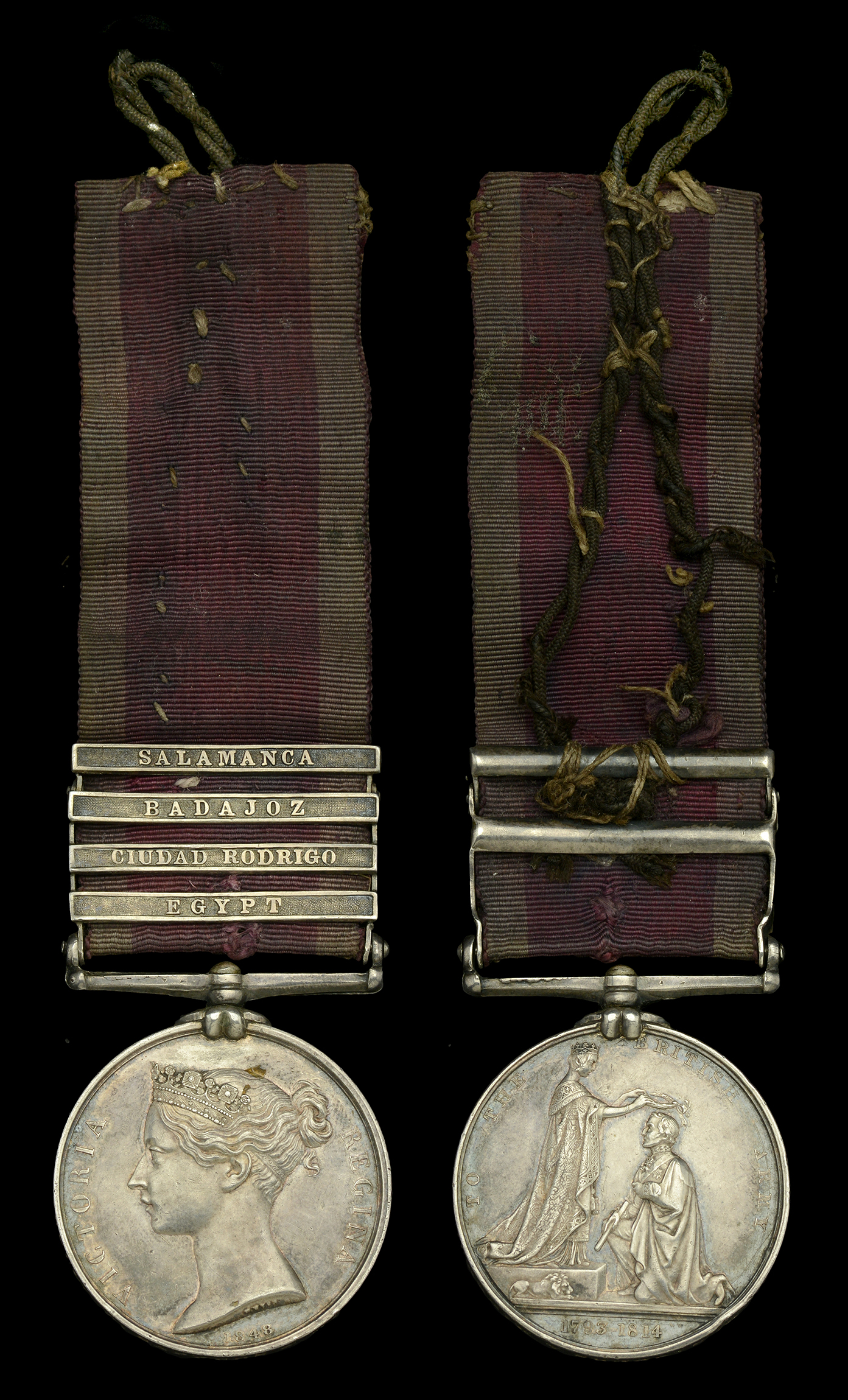Military General Service 1793-1814, 4 clasps, Egypt, Ciudad Rodrigo, Badajoz, Salamanca (J. Campbell, R. Sappers & Miners.) with original ribbon sewn with cord loop for wearing, small edge bruise, otherwise toned, good very fine and rare £2,400-£2,800 --- Confirmed on the roll of the 90th Regiment for Egypt, and on that of the Royal Sappers & Miners for Ciudad Rodrigo (16 clasps issued to the Corps), Badajoz (33 clasps issued) and Salamanca (unique clasp to the Corps - see note below). James Campbell was born in the Parish of Udney, near Aberdeen and originally enlisted into the 90th Foot on 15 February 1794, aged about 16 years 3 months, a miner by trade. He served with the 90th during the campaign in Egypt in 1801, seeing action at the battle of Abukir on 8 March, and the battle of Mandora on 13 March before returning to Malta in September 1801 and sailing for England in February 1802. The battle of Mandora was the opening action of what became known as the battle of Alexandria which culminated on 21 March 1801. In the action at Mandora the whole army was preceded by an advanced guard of the 90th Regiment marching in front of the centre column and the 92nd Highlanders with two guns in front of the left column. As the British advanced, they were subjected to a heavy fire from the French guns on the heights. The difficulty of dragging the guns through the sand delayed the main British columns and the two advanced regiments outdistanced them. The contours in the ground concealed the centre column from the French on the high ground and they supposed the 90th and 92nd Highlanders to be unsupported. The French 22nd Chasseurs à Cheval caught the 90th Regiment in the course of deploying into line but he massed 90th held their fire until the French cavalry were almost upon them and shattered the Frenchmen with a volley fired at a few yards distance. The French infantry then came up and fell upon the 90th and 92nd, which fought hard to hold them. Eventually the British centre and left columns came up and joined the fighting and the French began to fall back under the pressure, the 92nd Highlanders capturing three guns in the French position. By the evening Abercromby resolved to abandon the attack and his army fell back to the Roman Camp position. French casualties in the day’s fighting were around 500 officers and soldiers killed, wounded or captured. British casualties in the Army amounted to 6 officers and 150 men killed, 66 officers and 1016 men wounded. The Royal Navy, crewing the gunboats and Marines suffered 3 officers and 27 men killed and 4 officers and 50 men wounded. The 90th Regiment alone suffered 240 casualties and the 92nd Highlanders 140 casualties. Both regiments were subsequently awarded the battle honour ‘Mandora’ for their gallantry in the fighting on 13 March. Upon his return to England, Private James Campbell was discharged to ‘out-pension’ on 5 May 1802, which would suggest that he had been wounded or suffered other injury during the campaign like opthalmia, a common affliction amongst the army in Egypt. Nevertheless, he returned home to his native Aberdeen, where he remained on the pension list until 18 April 1809, when he enlisted once more at Aberdeen, this time for the Sappers and Miners, his mining knowledge clearly making him an attractive specialist recruit for the Corps. It is not recorded when he went to the Peninsula but a continual supply of small detachments of the Corps were sent out to Spain and Portugal during the campaign. It is clear though that he was present during the sieges of Ciudad Rodrigo, Badajoz and Salamanca, as reflected by his M.G.S. medal. ‘In June [1812], nine rank and file were present under Lieutenant-Colonel Burgoyne, R.E., at the siege of the fortified posts at Salamanca. Private James Durant was killed in the trenches on the night of the 17th June, and four privates were wounded. Thanks for their good conduct in the siege of the forts was conveyed to them in general orders’ (History of the Royal Sappers and Miners by T. W. Connolly refers). Campbell was discharged at Westminster on 31 October 1816, ‘having been found unfit for service from Debiity, and being placed on the Pension List at one shilling per diem from the 1st of November next, agreeably to the Lieut. General & Board’s order of the 25th instant.’ He was then paid ‘Three Pounds fifteen Shillings & /9d’ to allow him and his wife to return to Aberdeen, ‘the Place of my original Inlistment’. Note: Sub-Lieutenant Grattan is shown on the M.G.S. roll for 6 clasps including Salamanca but his first 5 clasps, up to and including Salamanca, were earned as a private in the 3rd Foot Guards, making Campbell’s clasp unique to the Sappers & Miners. Sold with copied discharge papers.
Auctioneer's Buyers Premium: 24% (+VAT)
There is an additional charge of 4.95% (+VAT/sales tax)
See Full Terms And Conditions





